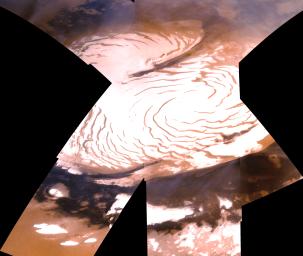North Polar Ice Cap
Caption:
North polar ice cap of Mars, as seen during mid summer in the northern hemisphere. The reddish areas consist of eolian dust, bright white areas consist of a mixture of water ice and dust, and the dark blue areas consist of sand dunes forming a huge 'collar' around the polar ice cap. (The colors have been enhanced with a decorrelation stretch to better show the color variability.) Shown here is an oblique view of the polar region, as seen with the Viking 1 spacecraft orbiting Mars over latitude 39 degrees north. The spiral bands consist of valleys which form by a combination of the Coriolis forces, wind erosion, and differential sublimation and condensation. In high-resolution images the polar caps are seen to consist of thick sequences of layered deposits, suggesting that cyclical climate changes have occurred on Mars. Cyclical climate changes are readily explained by quasi-periodic changes in the amount and distribution of solar heating resulting from perturbations in orbital and axial elements. Variations in the Earth's orbit have also been linked to the terrestrial climate changes during the ice ages.
Cataloging Keywords:
| Name |
Value |
Additional Values |
| Target |
Mars |
|
| System |
|
|
| Target Type |
Planet |
|
| Mission |
Viking |
|
| Instrument Host |
Viking 1 Orbiter |
|
| Host Type |
Orbiter |
|
| Instrument |
Visual Imaging Subsystem - Camera A |
|
| Detector |
|
|
| Extra Keywords |
Color, Dune, Dust, Water |
| Acquisition Date |
|
| Release Date |
1996-06-03 |
| Date in Caption |
|
|
| Image Credit |
NASA/JPL/USGS |
| Source |
photojournal.jpl.nasa.gov/catalog/PIA00009 |
| Identifier |
PIA00009 |

